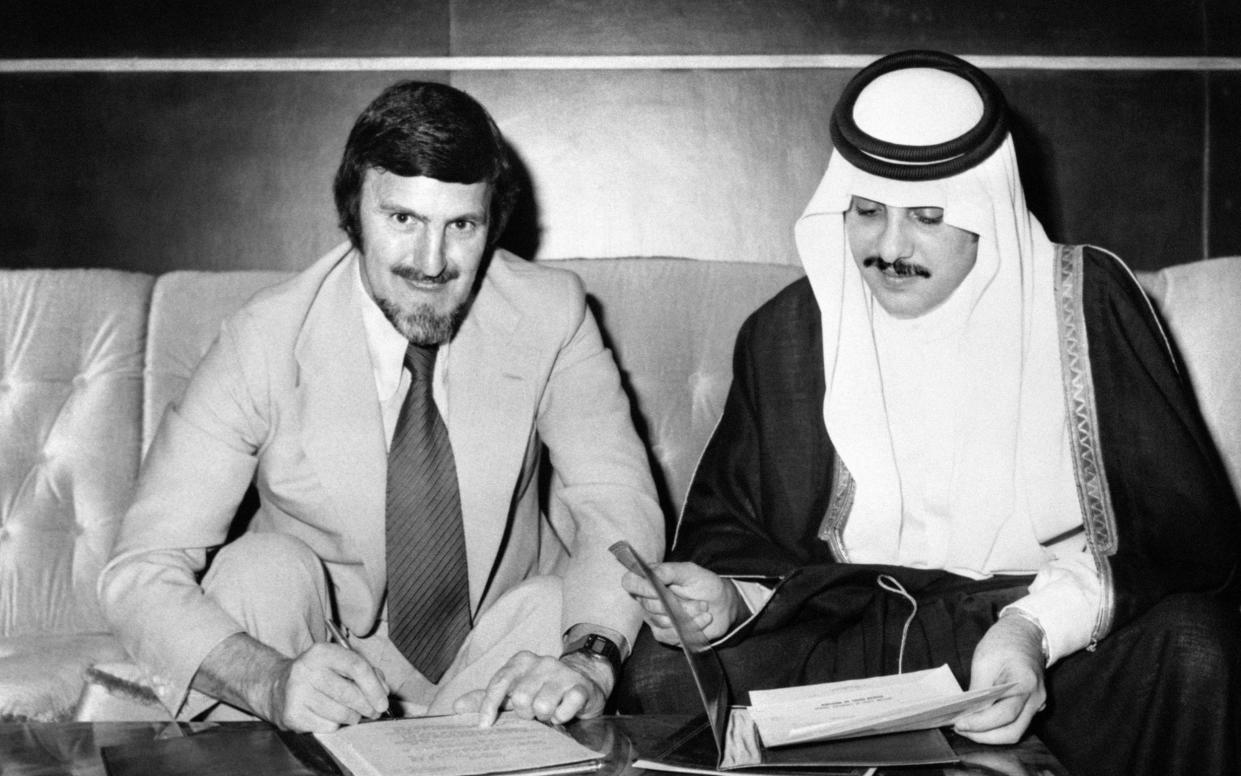Why Jimmy Hill deserves the credit for Saudi Arabia's finest hour

When Salem al Dawsari wriggled free on the edge of the box and curled a beautiful shot past Argentina goalkeeper Emiliano Martinez at the Lusail Stadium outside Doha, the Al Hilal forward had achieved two seemingly unlikely things.
Not only did his goal secure one of the great upsets in World Cup history but it also fulfilled a prophecy started by an unlikely figure: Jimmy Hill.
The Saudis have long been a football power in Asia and have used their power, wealth and influence to build a formidable, thriving domestic league. Whilst many question Qatar’s footballing history, the same cannot be said for Saudi Arabia, where you will find regular crowds of 50,000 for big games, especially between Jeddah's Al Ittihad, and Al Hilal, from Riyadh, in the Saudi Clasico.
And at the root of their modern football history is Hill. In 1976, the former Coventry manager and TV pundit was offered the chance to come to Saudi Arabia and essentially build Saudi football from scratch. The Saudi federation had only joined Fifa in 1956. They had never even tried to qualify for a World Cup.
Hill was brought in as a technical director and handed what was then an astonishing sum of £25 million, to build a new league and a new national team.
“What is absolutely certain is that they will play far better than they will at the moment,” Hill said in an interview when he signed the contract. “And what is certain is that a 10-year-old kid who in the past was born in Saudi would have no chance of being a top-class player. Now he will have a chance.”
Under Hill a new national league was formed and Saudi Arabia entered qualifying for the World Cup for the first time, ironically for Argentina ’78. He oversaw the emergence of a golden generation of Saudi players that would win the Asian Cup, the continental equivalent of the European Championship, and would cement them as one of Asia’s footballing powers. The World Cup remained elusive but, after a few near misses, they finally made it to USA ’94.
In fact, Al Dawsari’s goal will have brought back memories of that campaign. They reached the second round, still the only Middle Eastern team to do so, thanks to a spectacular solo goal from Saeed al Owairan against Belgium. Only Maradona’s second goal against England at Mexico ’86 legitimately betters it.
Money alone, though, was not enough to build a sustained threat. The Saudi government, as well as individual powerful royal princes, controlled football. The Saudi federation, like many Gulf states, did not like their players to play abroad. Only the legendary striker Sami al Jabar, who had a brief spell at Wolves in 2000, managed to leave the region. Subsequent World Cups did not go so well either, not least in 2002 when they lost 8-0 to Germany.
Reform seemed unlikely until the emergence of now Crown Prince Mohamed bin Salman. Big plans were announced to privatise Saudi clubs and to clear their debts. And to try to get Saudi Arabia back to the World Cup after missing both South Africa 2010 and Brazil 2014.
They returned to the World Cup in 2018. One of the most important reforms, though, was to open up the players to outside influence. In early 2018, with World Cup qualification secured, La Liga signed a multi-million euro deal with the Saudi federation to, amongst other things, send the country’s best players to Spain to get a few months of top level experience before Russia 2018.
And so, in January that year, nine Saudis arrived to play in Spain. The cream of that crop was Al Dawsari, who moved to Villarreal. “I want to learn from my mistakes and to reach a high level,” he said after he arrived on Spain’s east coast. “Because I am not representing only myself. I am representing Saudi Arabia.”
The Spanish media were unhappy with the deal. Marca’s frontpage declared “Petrodollars and La Liga”. The Spanish players’ union criticised La Liga for putting profits before talent. And it appeared that the plan had not worked out.
None of the nine players made any mark in Spanish football. Al Dawsari only made a handful of appearances for Villarreal. And Saudi Arabia lost the opening match of the 2018 finals 5-0 to Russia, with both Mohammed bin Salman and Vladimir Putin watching. But perhaps the benefit would just take time to be seen. The two Saudi goals against Argentina in Qatar were scored by Saleh al Shehri, who played briefly played in Portugal, and, of course, Al Dawsari.

Whilst the takeover of Newcastle United by the Public Investment Fund, Saudi Arabia’s sovereign wealth fund, chaired by the Crown Prince, has got most of the headlines, the next few years will see much more money flow into Saudi sport. Last month PIF announced it will be investing $2.3bn in sport, most of it on Saudi domestic football.
By the next World Cup, perhaps a result like this might not be a shock any more.

 Yahoo News
Yahoo News 
